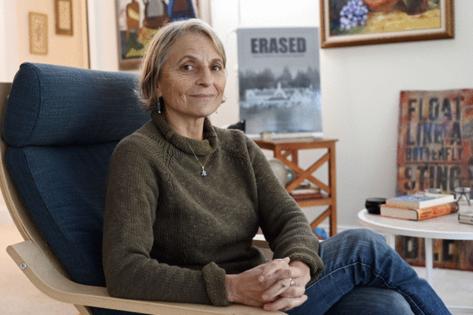Q&A: Baltimore documentarian investigates her mom's yearlong vanishing in new film
Published in Entertainment News
BALTIMORE — When Jill Yesko, an award-winning Baltimore documentarian, was a 9-year-old girl living in New Jersey, her mother suddenly disappeared. The 1967 vanishing of Sally Yesko disrupted the lives of Yesko and her younger brother. Their father, who Yesko said was a responsible caregiver, although emotionally distant, didn’t explain his wife’s disappearance.
As an adult, Yesko, 67, learned that her mother had spent the year at High Point Hospital, a private psychiatric facility in Port Chester, New York, that operated from 1951 to 1993.
After her mother died of COVID-19 in 2020, Yesko launched an investigation into her mother’s lost year as a High Point patient. The result is her new documentary, “Erased,” which will screen at the Towson Unitarian Universalist Church in Timonium on Nov. 12. The film will be available on a streaming platform sometime in the next two months.
In an interview with The Baltimore Sun, Yesko discussed her mother’s disappearance and the film. The conversation has been edited for length and clarity.
Q: What do you remember about the time when your mom went away?
A: I just remember it was a very sad time. I felt alone and abandoned and confused. As a child, time is really malleable, so you think you’re just going to be alone forever. My brother, who is a year and a half younger, was really the only constant, and we kind of clung to each other like Hansel and Gretel. It felt like a bad fairy tale.
Q: How was your mom different when she came back?
A: Before High Point, my mom was a style icon. She was loving. We took family vacations. When my mom came out of High Point, she was bloated. She didn’t take care of herself. She didn’t dress as well. She spent a lot of time in bed. Her moods were unpredictable. I was just a child when she came back. She didn’t explain, and I didn’t question it.
Q: Why do you think your mom never talked about her year away or why she left?
A: I think she was embarrassed about it. It was obviously a very painful time for her, because for any mother to leave two young children is a terrible, terrible decision to make, even if at the time you think it’s the right one.
And then as time went on, I think she thought, this is just something from all of our pasts that doesn’t need to be reexamined. And I understand that from her point of view, but I think it was hard for our mother to understand how we felt. It was an unpleasantness that she did not wish to revisit.
Q: Why do you think your father did not say anything about your mom’s disappearance?
A: Yeah, that was weird too. Understand, this is in the 1960s, and my dad was almost 50 years old when I was born. He was a really old-school guy. For him, maybe taking care of the family was enough, and my mother had to deal with everything emotional. I think my dad was embarrassed. Also, he was in state politics and was building a career. He was a very successful lawyer, and I think he didn’t want it to get out that his wife was in a mental hospital because there was so much stigma.
Q: Do you believe High Point Hospital provided any real psychiatric care to its patients?
A: Of the patients I’ve contacted or who’ve contacted me, I would say 99% of them say, ‘Absolutely not.’ There’s a private [Facebook] group for former patients that I’m in, and this is where I’ve gotten a lot of my patients from [for the documentary]. I can’t say that they’re a total representative sample; these are obviously people who are aggrieved, but I do think that they represent the majority of the patients.
Q: What kinds of emotions did you experience as you worked on the film?
A: I started thinking about the movie when I was really sad, when I was in grief about the death of my mother during the pandemic. When a parent dies, that first year is really hard; a million things go through your mind. So this project started in grief, but once I got going, I was determined. At first, I was hopeful I could find out about my mom and solve the mystery. And when I realized that wasn’t going to happen, I was even more determined to tell the stories of the people who did share their experience with me. In the end, I feel OK; complete healing is really overrated. I accomplished what I needed to do.
Q: Now that you have done all this research, is there anything you would say to your mom, if you could?
A: I can tell you that my mother would not have wanted me to make this film, honestly. She would say, ‘Why do you want to revisit so much unpleasantness? You’ve got to look forward and not look back.’ I never would have made this film without her consent, nor done anything to hurt her. But I also feel like I have found so many patients who were harmed there and now have the opportunity to speak their minds. I feel like this is a really important film. It’s less about me now, obviously, than it is about them.
©2025 Baltimore Sun. Visit baltimoresun.com. Distributed by Tribune Content Agency, LLC.













Comments